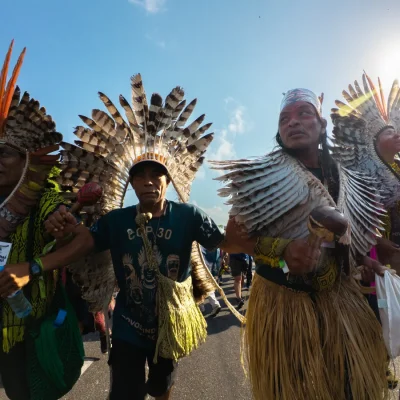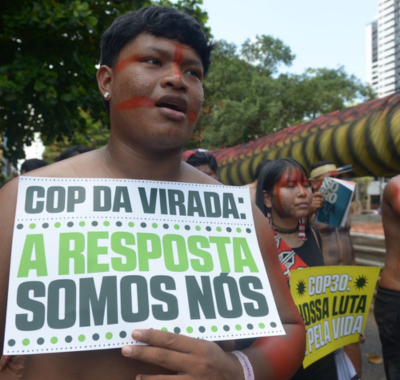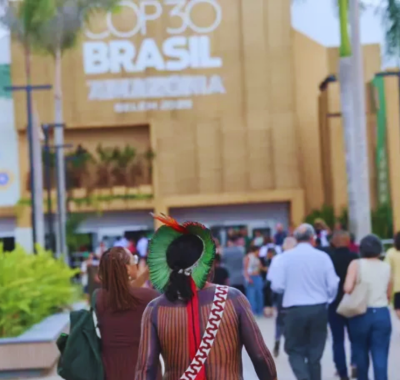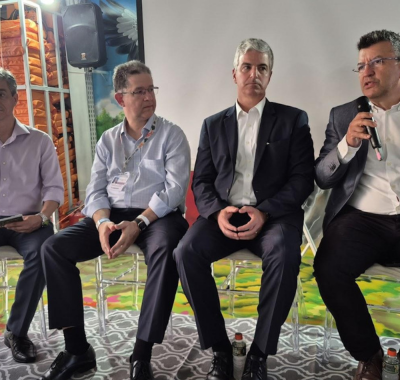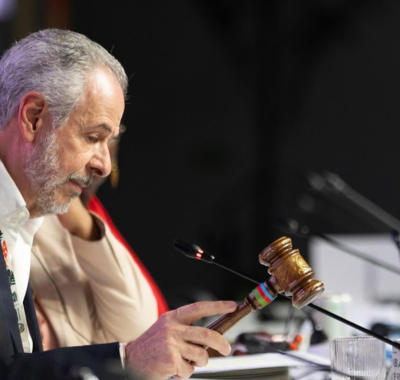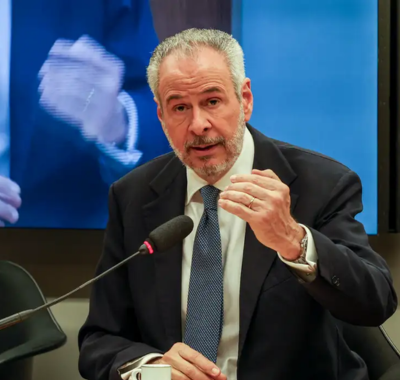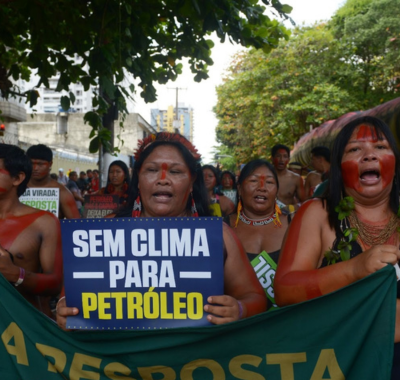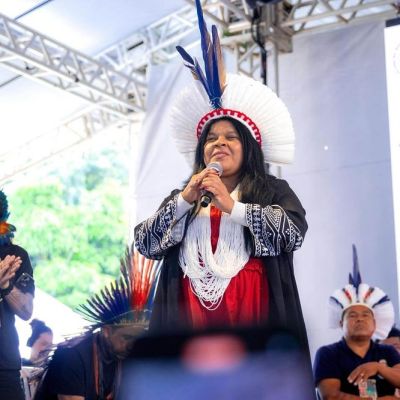In Belém, public hearings symbolically tried 21 cases of socio-environmental violations. Experts warn: greenwashing has become more sophisticated and turned into a disinformation strategy.
By: Gabi Coelho
Translated by Diego Lopes/Verso Tradutores
At the 30th United Nations Climate Change Conference (COP30) in Belém, governments are advocating for climate targets and companies are promoting carbon neutrality plans. Meanwhile, pressure is growing from social movements, researchers, and media professionals to expose a phenomenon that defines the environmental policy of the decade: the rise of false climate solutions.
The term describes initiatives presented as sustainable — waterways, mega-energy projects, carbon markets — that, in practice, expand the frontier of exploitation and leave a trail of socio-environmental violations.
According to experts interviewed by InfoAmazonia, the greenwashing — a deceptive marketing strategy in which companies promote an environmentally responsible image —, which was previously limited to the corporate environment, has become a disinformation engine used to influence political decisions, delegitimize impacted communities, and neutralize criticism of predatory enterprises.
Court against ecogenocide
An arena was set up to expose what was left out of the official negotiations: on the 13th and 14th of this month, the People’s Court against Ecogenocide held public hearings to symbolically judge 21 cases of socio-environmental violations in the Amazon and other territories.
According to the court’s presentation document, produced by the Grassroots Climate Organizations Movement (also known as the People’s COP), the aim was “to create an alternative space for justice in the face of the crisis of legality that justice systems and governments promote by protecting and legitimizing practices and groups that destroy ecosystems, ways of life, and spiritualities.”
In the symbolic defendants’ dock were projects and companies presented as sustainable that, in practice, displace communities, destroy territories, and perpetuate predatory models. These are the so-called “false climate solutions” — initiatives sold as responses to the environmental emergency that, according to experts, serve as a smokescreen for maintaining the extraction of natural resources and the destruction of the forest.
Among the cases tried is the commercialization of carbon credits in Portel, in the Marajó archipelago. In that territory, according to the dossier, “representatives of carbon companies acted in bad faith and used coercion to secure abusive contracts,” while “the sale of carbon credits by these companies moved millions of dollars without the knowledge of the local people.”
The Belo Monte Hydroelectric Power Plant was another case framed as a false climate solution. The document describes that “Norte Energia, responsible for the Belo Monte HPP, failed to meet legal demands and agreements, even with the commitment to do so in its Basic Environmental Plan.”
The case involves 40,000 people forcibly displaced in the Middle Xingu River region, in Altamira (PA). According to the report, “those who were relocated to new neighborhoods suffered a new form of segregation, with the loss of their way of life due to the disruption of kinship and neighborhood networks and the loss of traditional economic activities.”
According to Thaís Brianezi, a professor at the School of Communication and Arts at the University of São Paulo (ECA/USP) and a member of the Educom&Clima Project, during COP30 “Brazil presents itself as a country with very good energy generation, because about 70% is renewable.” However, when looking at Belo Monte, “the generation of greenhouse gases from the flooding, that is, the flooded area, and the decomposition of organic material are often not included in the calculation.” This is without even considering the social aspect, she emphasizes.
Green infrastructure for commodities
The Court also judged cases of waterways presented as necessary in the face of climate emergencies, but which mainly serve the outflow of commodities. Regarding the dredging of the Tapajós River, the document points out that “in the face of the extreme droughts of 2023 and 2024, the National Department of Transport Infrastructure (DNIT) determined the dredging of the Tapajós River at ‘critical points’, justifying the work in the name of ‘navigation safety’ and ‘state of emergency’”. According to the dossier, “in ten working days, the State Secretariat for the Environment and Sustainability of Pará (SEMAS/PA) authorized the work without an Environmental Impact Study, without studies on the Indigenous and quilombola communities, and without prior, free and informed consultation.”
The Brazilian financial system was also held responsible. According to the document, “Banco do Brasil, Banco do Nordeste, and Banco da Amazônia granted rural credit to farms embargoed for illegal deforestation, which violates environmental legislation and the regulations of the National Monetary Council.” IBAMA (Brazilian Institute of Environment and Renewable Natural Resources) imposed fines, but there was no reparation for the impacts on communities in the Amazon and Cerrado biomes.
False solutions under discussion
Also during the conference, the dossier “Integrity of Climate Information” was launched, prepared by the initiative Mentira Tem Preço (Lies Have a Price) and partners, as part of a global program dedicated to investigating and confronting environmental disinformation. “Lies are business. And business generates profit. Disinformation is not an accident; it’s a business model,” states Thais Lazzeri, founder and director of FALA, a Brazilian impact studio that promotes social change through communication, storytelling, and strategy.
The guide compiles evidence on information manipulation, greenwashing strategies, and recommendations for governments, journalists, and civil society. Lazzeri emphasizes that defending informational integrity depends on strengthening local journalism: “Community communicators are the first line of defense. They have a legitimacy that no national campaign has. They are the ones who keep the agenda alive once the spotlight moves on.”
This contradiction between the discourse of sustainability and the reality experienced in the territories was the guiding thread of one of the main themes of debate at the People’s Summit — a parallel event that brought together social movements, civil society organizations, and traditional communities during COP30. The theme “Combating environmental racism and false solutions” structured discussions that culminated in the People’s Charter, a document delivered to the COP ambassador on the final Sunday of the event.
The roundtables addressed the defense of territories against land-based racism, the right to prior consultation in the face of the climate market, carbon markets as a false solution, agroecological production as an alternative, and the risks of repeating past mistakes in the so-called energy transition.
Events running parallel to the official program also addressed the topic. The Institute for Defense and Citizenship (IDEC) promoted the workshop “It’s a green lie! How to identify and report greenwashing“ and the pre-launch of the observatory “Keeping an Eye on Greenwashing“ at the NGO House. At the Waldemar Henrique Theater, there was a debate about climate disinformation and how to recognize and combat false narratives in the context of elections and public policies.
The organization Justicia Climática Comunicaciones promoted the meeting “Confronting False Solutions to Climate Change from Latin America and the Caribbean,” which discussed climate justice strategies in Latin America and the Caribbean to highlight, analyze, and denounce false solutions, as well as presenting a map of false climate solutions and initiatives for popular education and communication.
The sophistication of greenwashing
What these events have shown is that the corporate appropriation of the sustainability discourse has become increasingly sophisticated. According to Débora Salles, general coordinator of the Laboratory for Internet and Social Network Studies at the Federal University of Rio de Janeiro (NetLab UFRJ), the Netlab study “Greenwashing in the Energy Transition: How LinkedIn ads distort the climate debate and legitimize unsustainable practices,” identified evidence of greenwashing in more than half of the ads analyzed — 52.7% of 2,800 advertisements run by 917 companies. According to Salles, the ads used “vague terms, such as ‘energy transition’ and ‘carbon neutral,’ without offering concrete evidence and emptying the meaning of sustainability.”
According to Salles, this practice “manipulates public perception through the dissemination of incomplete and distorted information about socio-environmental practices.” She argues that this practice leads consumers, investors, and policymakers to believe that certain companies are committed to a sustainable transition, “when, in practice, they continue to reproduce models with a high environmental impact.”
Brianezi adds that “disinformation has become more sophisticated; it is no longer necessarily denying the existence of a climate emergency.” According to the researcher, the strategy now is more subtle — as in the case of fossil fuel companies that claim they need to “continue exploring for oil, find new deposits, and exploit resources to make the energy transition.”
Recently, InfoAmazonia revealed that, since March 2023, members of the Parliamentary Front for Sustainable Mining have been disseminating mining-related campaigns using funds from their offices, while also omitting information from platform users about the environmental impacts.
News deserts
The poor quality of journalistic coverage exacerbates the problem. According to Salles, the study “Local Media Coverage of Large Projects in the Amazon” found that “the local press in the Legal Amazon lacks specialized and in-depth coverage.” Local media outlets “massively reproduce news from government agencies and official sources. This privileges hegemonic views while silencing voices that have already been historically marginalized.”
For Brianezi, local and community-based communication is fundamental because “we need not only to fact-check data, but also to deconstruct narratives and reconstruct other economic possibilities.” According to her, these multiple perspectives come “from the peripheries, from the urban peripheries, from the peripheries of the forest, from the countryside, from the voices that have been historically silenced.”
The USP researcher points out that news deserts “are not just geographical, they are thematic.” She questions: “Why, when there is an extreme weather event affecting higher-income regions, does it get much more coverage in the newspapers than when it affects the outskirts? Because we normalize inequality.” This is, according to Brianezi, “a fundamental issue for combating the climate emergency from the perspective of climate justice.”
Brianezi argues that combating false narratives requires working “on two fronts: denunciation and proclamation.” Denunciation involves “deconstruction, fact-checking, and questioning narratives.” But simply denouncing is not enough. “We have to make a proclamation showing other forms of economy, of production that are out there, where the economy is a means and the greater good is life, the collective,” she argues, citing the circular economy, the care economy, and the concept of good living. According to her, working only on denunciation does not mobilize: “we also need to work showing that other worlds are possible, so that we don’t believe that the end of the world is easier than the end of capitalism.”
This report was produced by InfoAmazonia, through the Collaborative Socio-environmental Coverage of COP 30. Read the original report at: https://infoamazonia.org/2025/11/21/falsas-solucoes-climaticas-avancam-na-amazonia-enquanto-cop30-discute-futuro-do-planeta/




